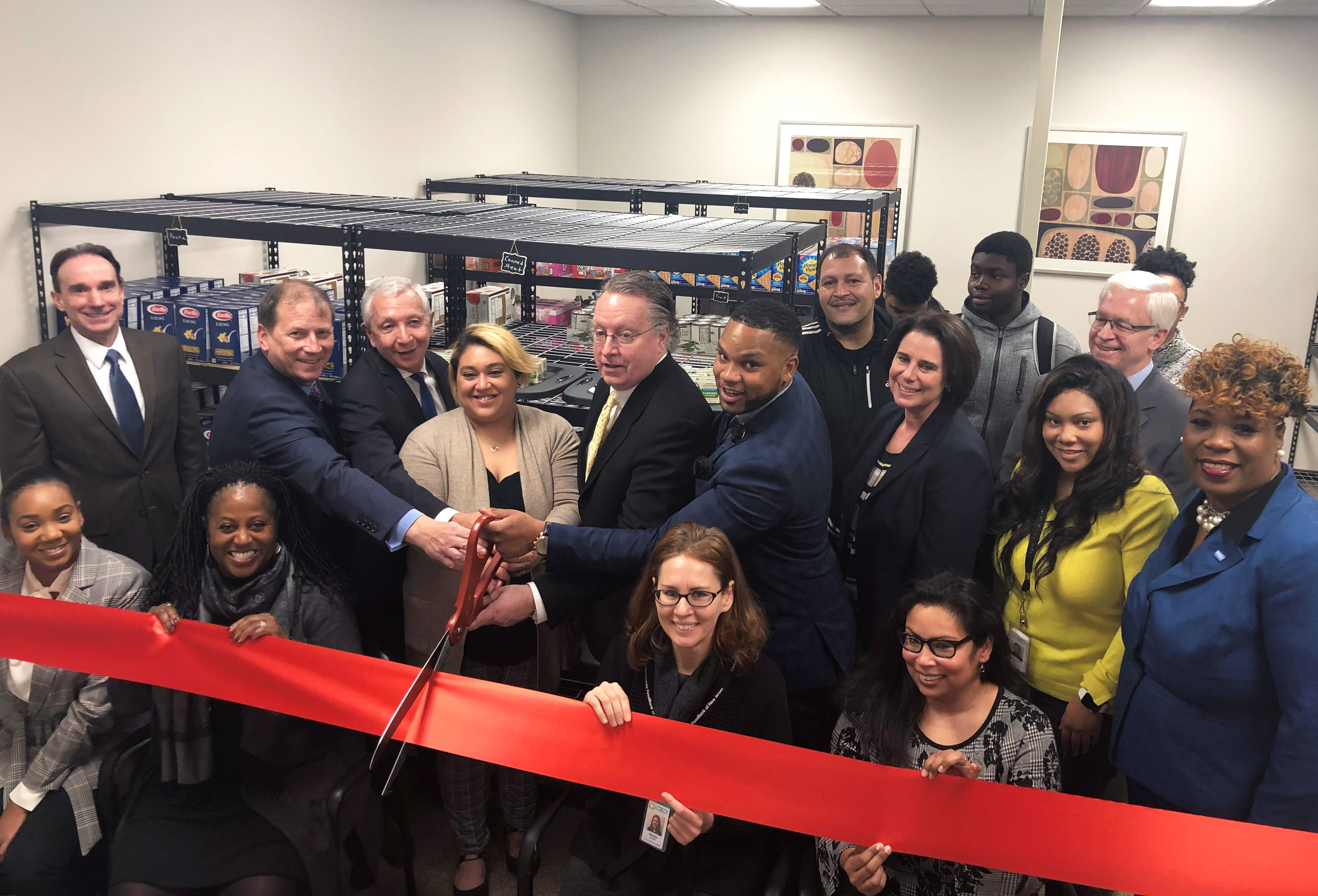
by Chanel L. Donaldson | Jan 18, 2019 | Partner Highlights
NCLC partners at the Berkeley College Foundation launched its newest resource to help students succeed with a ribbon-cutting ceremony on January 8, 2019. A food pantry, located at Berkeley College’s Newark campus on Broad Street, was made possible through a $10,000 donation from the Foundation.
“There are many factors that contribute to success,” said Kevin L. Luing, Chairman, Berkeley College Board of Trustees, who spoke about his 15-year relationship with the Community FoodBank of New Jersey. “Now we can help with basic needs, and offer another resource to help our students be successful.”
The Center for Food Action estimates that one-third of undergraduate college students nationwide face food insecurity. According to a study by Feeding America, Essex County has the highest rate of food insecurity in New Jersey. Berkeley College is one of 20 colleges offering food pantries on campus in the Garden State.
“Our students are working hard in the classroom, at their internships, and at their jobs, but hunger can make it hard to focus, and hard to be successful,” said Michael J. Smith, President of Berkeley College. “Students go to college to build better lives for themselves and their families. They should not have to choose between going to school and eating a healthy meal.”
The mission of the Berkeley College Foundation is to provide financial support for student success, including through scholarships and educational enrichment.
“The Berkeley College Foundation recognizes both the basic and complex challenges that students face every day as they pursue their dreams,” said Dario A. Cortes, PhD, Executive Director, Berkeley College Foundation. “It is our hope that through this food pantry, we can remove some of these barriers to success, so our future leaders can reach their full potential.”
Michelle Jansen, Director of Schools and Community Outreach at the Community FoodBank of New Jersey, voiced her support of the Foundation’s efforts.
“We know that students across the state struggle with the hard decision of paying for tuition, paying for books, paying for housing, and paying for food,” Ms. Jansen said. “It is a decision no one should have to make. With the creation of this food pantry, we know hunger has no place on this Berkeley College campus.”
Erica Xicara of Linden, NJ, Vice President of the Student Government Association at Berkeley College in Newark, will complete her Associate’s degree in Health Sciences this year. The wife and mother of two shared her personal challenges in balancing her education with the basic needs of her family.
“The real struggles are the ones we face outside of school,” said Ms. Xicara, adding that she and her husband made significant career adjustments so she could pursue her degree. “The food pantry will ease the burden of students who struggle to feed their families because they have made the choice to better their lives.”
The food pantry offers more than 30 items such as pasta, tuna fish, granola bars and soy milk. The resource will be open three days a week to Berkeley College students from all campuses.
See the Photos: Click here to view photos from the food pantry ribbon-cutting ceremony at Berkeley College in Newark.
View the full article here: https://newsroom.berkeleycollege.edu/news/berkeley-college-foundation-launches-food-pantry-in-newark-to-help-students-succeed
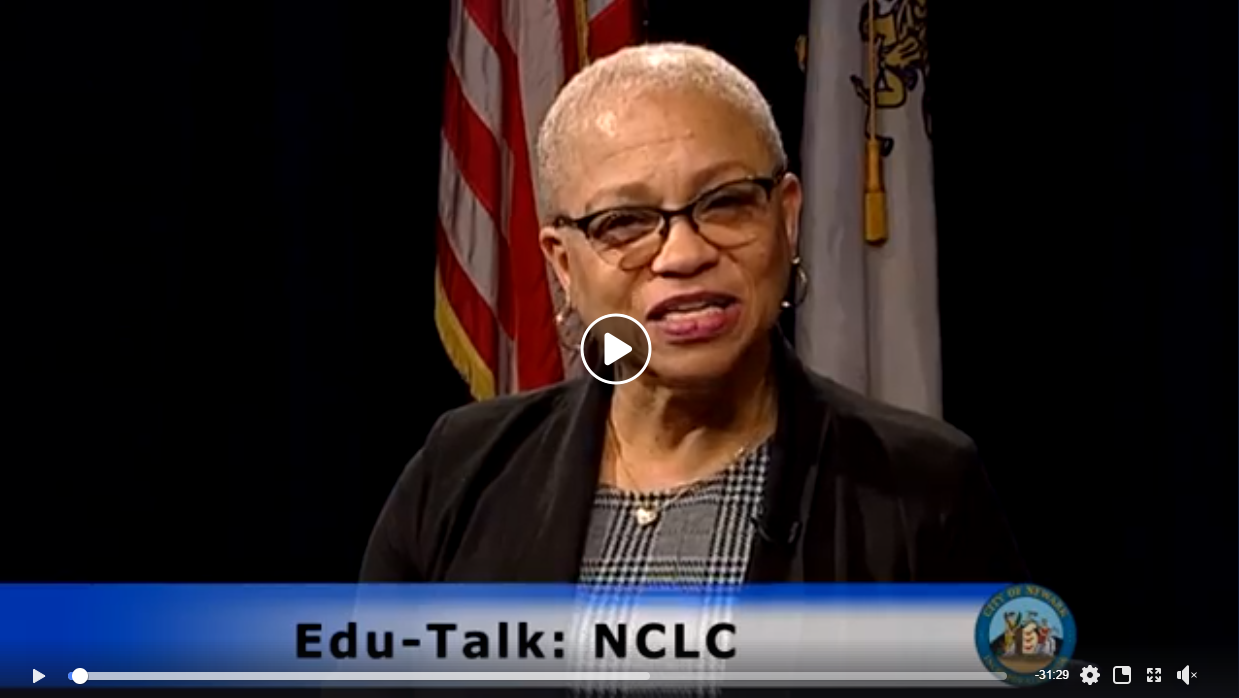
by Chanel L. Donaldson | Dec 18, 2018 | News1, Video
Chief Education Officer for the City of Newark, Antoinette Baskerville-Richardson, sits down with Executive Director of the Newark City of Learning Collaborative (NCLC), Reginald Lewis, to discuss the recently released Post-Secondary Outcomes report and learn more about how NCLC is working to build a college-going culture in Newark. From Bard High School Early College, Principal Dr. Carla Stephens and senior Becky Akinyemi also join the conversation to discuss dual enrollment as a model for expanding access to rigorous coursework and improving college readiness for Newark students.
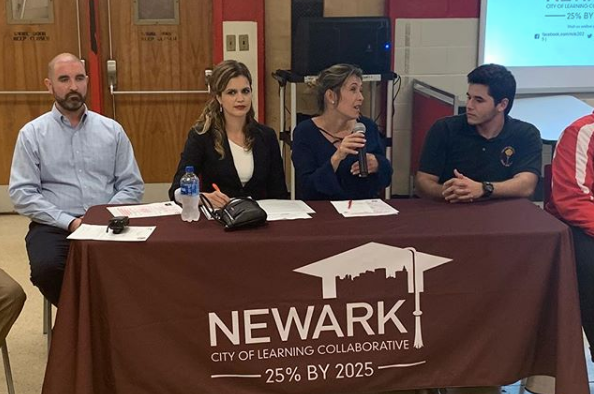
by Chanel L. Donaldson | Oct 18, 2018 | News1
Building a college-going culture in Newark may not happen overnight, but the process is well underway, thanks to the efforts of the Newark City of Learning Collaborative (NCLC), which is conducting an ongoing series of roundtable discussions with Newark communities.
In July, Newark City of Learning Collaborative (NCLC) and Rutgers University-Newark School of Public Affairs and Administration released Post-Secondary Outcomes of Newark High School Graduates, an analysis that gives insight for the first time on college enrollment, persistence and completion for 13,500 high school graduates from 2011 until 2016. At a press conference last month, the NCLC announced its roundtable series to discuss outcomes and how to best leverage the results. The first was held on October 2 at East Side High School.
“The NCLC, City of Newark and Newark Board of Education are taking a monumental step in charting a new course for our beloved city,” said Superintendent Roger León during the press announcement. “I am a proponent of engaging the community on all issues pertaining to them – that is why this exercise is integral to the success of our students and city. We will significantly shift the trajectory upward and provide a roadmap that will profoundly impact Newark and change it forever.”
The Newark City of Learning Collaborative (NCLC) launched in January 2015 to increase the percentage of Newark residents with higher education credentials or degrees from 17 percent to 25 percent by 2025. While more students are enrolling in college, not enough students are persisting through to make it to graduation. According to the report, 54 percent of students in the sample enrolled in college by October the following year, a substantial improvement from 39 percent from a 2004-2011 grad cohort.
“The report doesn’t tell us why and it doesn’t tell us how. That’s what we’re hoping to get out of tonight’s conversation,” said Kristi Donaldson, education research and policy postdoctoral associate at NCLC, who co-authored the report. “What do we do with this? What are some of the next steps?”
The NCLC invited school leaders, educators, parents, students, and policymakers from across the city to their roundtable series to discuss the findings and brainstorm solutions to get more students to and through college.
“We want to do something with this rich information which we’ve never had prior to now. We think it’s important for all of Newark to understand what we found out,” said NCLC executive director, Reginald Lewis. “We want to figure out ways in which there can be a collective response to supporting our young people to getting in and persisting through our colleges.”
During the meeting, a speaker in the audience posed the question about how Newark can recreate a culture of going to college similar to the experience he had growing up in nearby Livingston, a suburban town a half hour away. He talked about being exposed to college campus often as early as middle school and taking the PSAT to measure college readiness and screen students for early scholarships. Efforts toward this are being made by superintendent Roger Leon when he announced last month that eighth and ninth graders are required to take the PSAT starting this October.
One way to change the culture around going to college is to adjust how students perceive and approach the college application process, suggested East Side High School student Gabriel Morgarca. “Upperclassmen can help lowerclassmen get excited about the process,” he said. “If we can get them to see that as a positive experience instead of a stressful, negative one, then I think we can help inspire this culture of success.”
The next discussion in the NCLC Roundtable Series is at Malcolm X Shabazz High School in the South Ward on October 25, 2018. All forums start at 6pm, end at 8pm, and serve dinner. The remaining roundtable dates and locations are:
- Thursday, November 1, 2018 at Central High School in the Central Ward
- Monday, November 5, 2018 at Barringer High School in the North Ward
Story submitted by Kei-Sygh Thomas, a freelance journalist based in Newark, NJ.
Photo by Kei-Sygh Thomas.
This story was originally featured at https://www.civicstory.org/civics-blog/2018/10/18/how-to-build-a-college-going-culture
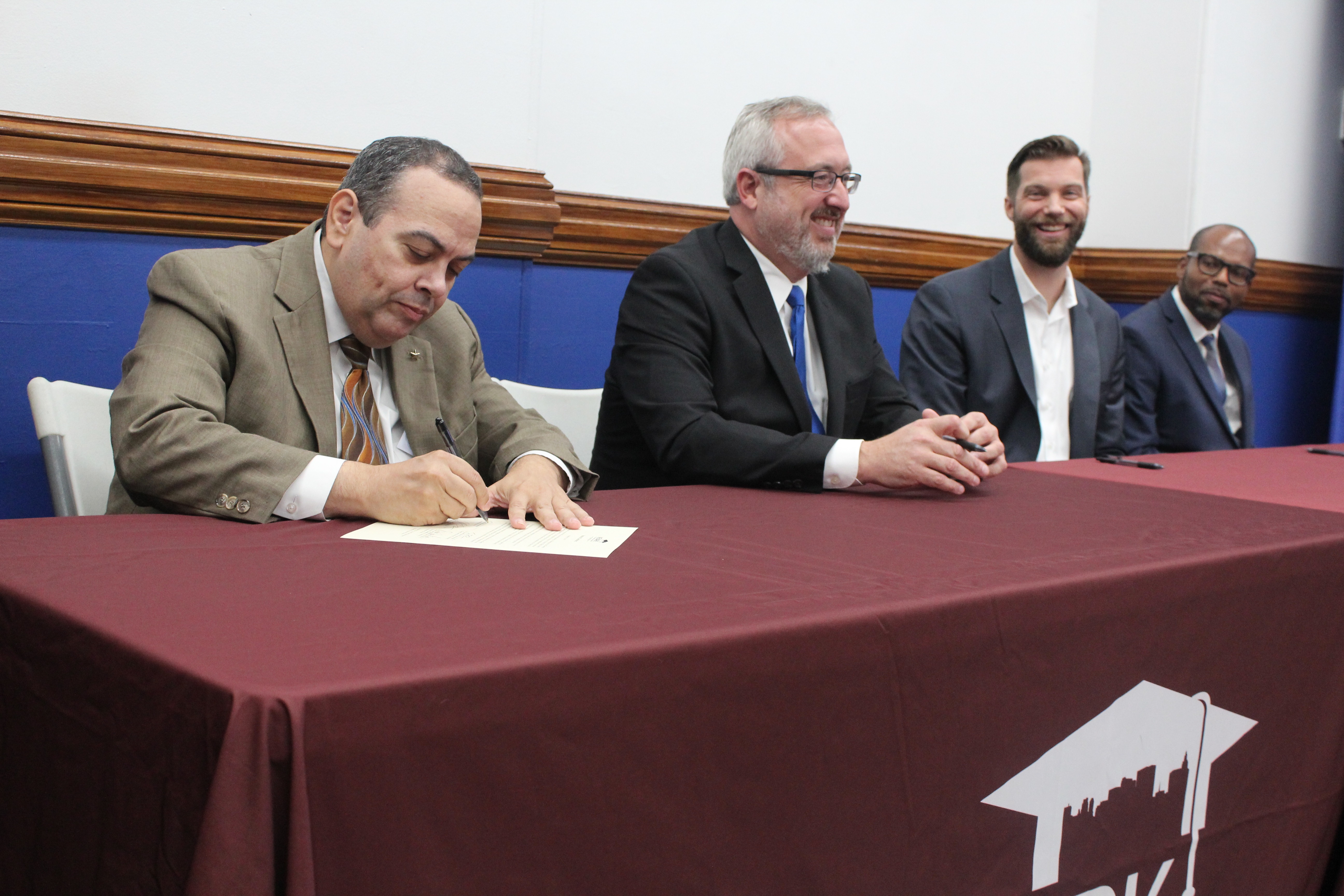
by Chanel L. Donaldson | Sep 20, 2018 | News1
Mayor Ras J. Baraka, Newark Public Schools Superintendent Roger León, Newark City of Learning Collaborative (NCLC) Executive Director Reginald Lewis, Essex County Schools of Technology Superintendent Dr. James Pedersen, KIPP New Jersey Chief External Officer Ben Cope, and St. Benedict’s Prep Dean of Seniors and College Placement Didier Jean-Baptiste announced at a press conference on Wednesday, Sept. 19, the launch of public conversations throughout the city of Newark to increase the number of Newark residents with college and other post-secondary certificates by 25 percent by 2025.
NCLC is an initiative created to help build Newark’s college-going culture by ensuring that all Newarkers have the tools and resources needed to matriculate at and graduate from college. Accordingly, the citywide public conversations will address topics and issues derived from Post-Secondary Outcomes of Newark High School Graduates, a report produced by NCLC in collaboration with the Rutgers University-Newark School of Public Affairs and Administration that examines what college-going looks like for nearly 13,500 of Newark’s recent graduates. Covering approximately 85 percent of all Newark high school students who graduated between 2011 and 2016, the report examines college enrollment, persistence, and completion rates.
“The good news is that we know more Newark students are enrolling in college, but we also know that far too few are persisting to degree completion,” says NCLC Executive Director Reginald Lewis. “We hope that this report will serve as a resource to better understand the experiences of recent high school graduates.”
“As both a 22-year Newark Public Schools educator and mayor, one of my life’s greatest priorities has been to provide our youth with opportunities to advance their education after graduating from high school. The City is advancing this priority by collaborating with major partners to increase the number of Newark residents with college degrees and post-secondary certificates by 25 percent by 2025. To do so, we will talk to and listen to our residents and get their input, ideas, and concerns, in making this goal a reality. It will be attained, and our residents will be both the power behind it and the ultimate beneficiaries,” Mayor Baraka said.
At the press conference, representatives from all sectors of the K-12 spectrum (e.g., traditional public, charter, vocational technical, and private schools) also reaffirmed their unprecedented partnership and manifested their continued commitment to strengthen the high-school-to-college transition for all Newark students by signing a Statement of Commitment.
“The NCLC, City of Newark and Newark Board of Education are taking a monumental step in charting a new course for our beloved city,” said Superintendent León. “Through these community conversations, we are giving voice to the people who will help determine how soon we will become a national leader in the number of residents who are college graduates. León continued, “I am a proponent of engaging the community on all issues pertaining to them – that is why this exercise is integral to the success of our students and city. We will significantly shift the trajectory upward and provide a roadmap that will profoundly impact Newark and change it forever.”
“The cross-sector collaboration was one of the highlights of the project and enabled us to examine college-going for a wide range of Newark high school graduates. One of our goals was really to put schools in conversation – not competition – with one another to learn and share best practices throughout the community,” remarked the report’s co-author Dr. Kristi Donaldson.
The first two rounds of public discussions will take place in October as follows:
East Ward Roundtable
Tuesday, Oct. 2, 2018, 6 p.m. – 8 p.m.
East Side High School (238 Van Buren Street, Newark, NJ 07105)
West Ward Roundtable
Wednesday, Oct. 17, 2018, 6 p.m. – 8 p.m.
Jehovah-Jireh Praise & Worship Church Center (505 S. 15th Street, Newark, NJ 07103)
Click here to download a pdf of Post-Secondary Outcomes of Newark High School Graduates.
Click here for more information about NCLC.
For media coverage on the announcement, click here
To view photos from the announcement, click here
This article first appeared at https://www.newark.rutgers.edu/news/newark-city-learning-collaborative-announces-launch-public-conversations-strengthen-newarks
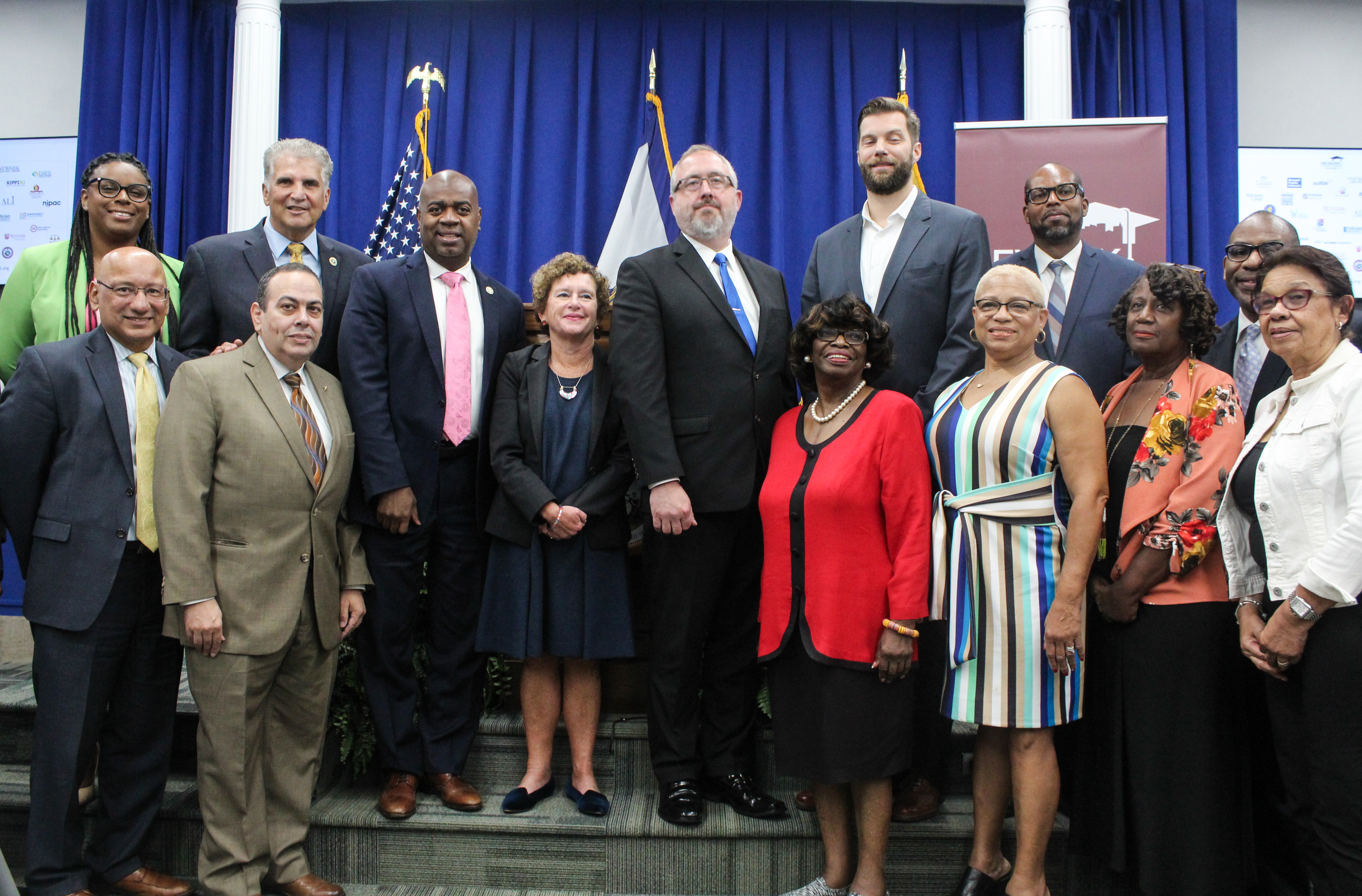
by Chanel L. Donaldson | Sep 19, 2018 | News1, Video
Compared to state and national rates, Newarkers have fallen behind in pursuing a college degree after high school. That’s according to study by Newark City of Learning Collaborative.
“NCLC exists due to the reality that not enough Newark residents are earning the degrees and credentials necessary to compete for viable employment in our city’s economy,” said Reginald Lewis, executive director of the organization.
The study covered the enrollment, persistence and completion rates of approximately 85 percent of all Newark high school students who graduated between 2011 and 2016. According to the study in 2017, roughly 19 percent of Newark residents earned a college degree or higher, compared to 45 percent of all New Jersey residents and 40 percent of Americans. And now the Mayor and city leaders are determine to change that with the goal of 25 percent by 2025.
“That is 25 percent of all Newark residents holding at least an associate’s degree or higher by 2025,” Lewis said.
“We just have to introduce our kids earlier to college in earlier grades and get them focused on it,” said Newark Mayor Ras Baraka.
Supporters of the study say it’s an opportunity to see what’s happening to high school students after they graduate.
“The transparency that the data provides in terms of visibility into how our kids are doing compared to other great Newark schools,” said Ben Cope, chief external officer of KIPP Charter Schools New Jersey. “It gives us a ton of insight into what we can be doing better.
Baraka says another problem is getting students to stay in college once they’ve enrolled.
“Maybe if they ran out of money, what the issues are, why kids are leaving school, leaving the university, and so we need to figure that out. It’ll help us prepare before they get there,” said Baraka.
According to the study’s “persistence findings,” 87 percent of Newark graduates who immediately enrolled in college returned for the next college term, and only 64 percent of students who immediately enrolled in college continued through the second year.
“When I was in high school, a lot of people wanted to drop out because they didn’t find the need to go to school, to go to college to get a job that they could get right after high school, like for example working in construction,” said Erika Baque, a 2016 Montclair State Graduate and a participant in the study.
“I just heard this morning a student lost her mom and said, ‘I don’t know if I can continue, I’ve got to come home and help the family find money for the funeral and then I’ve got to figure out how to find an income to provide for the rest of my household.’ So we see a lot of social, emotional and a lot of financial reasons why students are persisting and that’s our biggest challenge,” Cope said.
The NCLC says it will now hold public conversations in all five wards of the city to get more students in college and to make sure they stay there.
This article originally appeared at https://www.njtvonline.org/news/video/newark-looks-to-dramatically-increase-percentage-of-college-graduates-by-2025/
by Chanel L. Donaldson | Sep 12, 2018 | News1
Join the Newark City of Learning Collaborative (NCLC) and Mayor Ras Baraka on Wednesday, September 19, 2018 at 10:00 am at Newark City Hall for the official press release event for Post-Secondary Outcomes of Newark High School Graduates. School leaders, educators, parents, and policymakers from across the city are invited to learn more about the launch of a public conversation to evaluate and strengthen the high school to college transition for all Newark students. The press event will feature remarks for Mayor Ras Baraka; NCLC Executive Director, Reginald Lewis; Superintendent of Newark Public Schools, Roger León; Superintendent of Essex County Schools of Technology, Dr. James Pedersen; and Dean of Seniors and College Placement at St. Benedict’s Prep, Didier Jean-Baptiste. Community roundtables in each of Newark’s five wards are scheduled to take place this fall to continue the conversation.
About the Report
Post-Secondary Outcomes of Newark High School Graduates is an analysis of what college-going looks like for nearly 13,500 of Newark’s recent graduates. Housed at the Joseph C. Cornwall Center for Metropolitan Studies, NCLC is working to build Newark’s college-going culture by ensuring that all Newarkers have the tools and resources needed to get to and through college. The report was produced in collaboration with the Rutgers University-Newark School of Public Affairs and Administration. Covering approximately 85 percent of all Newark high school students who graduated between 2011 and 2016, the report examines college enrollment, persistence, and completion rates.
Download a pdf of the full report here.
Click here or more information about Post-Secondary Outcomes.
Click here for more information about NCLC.
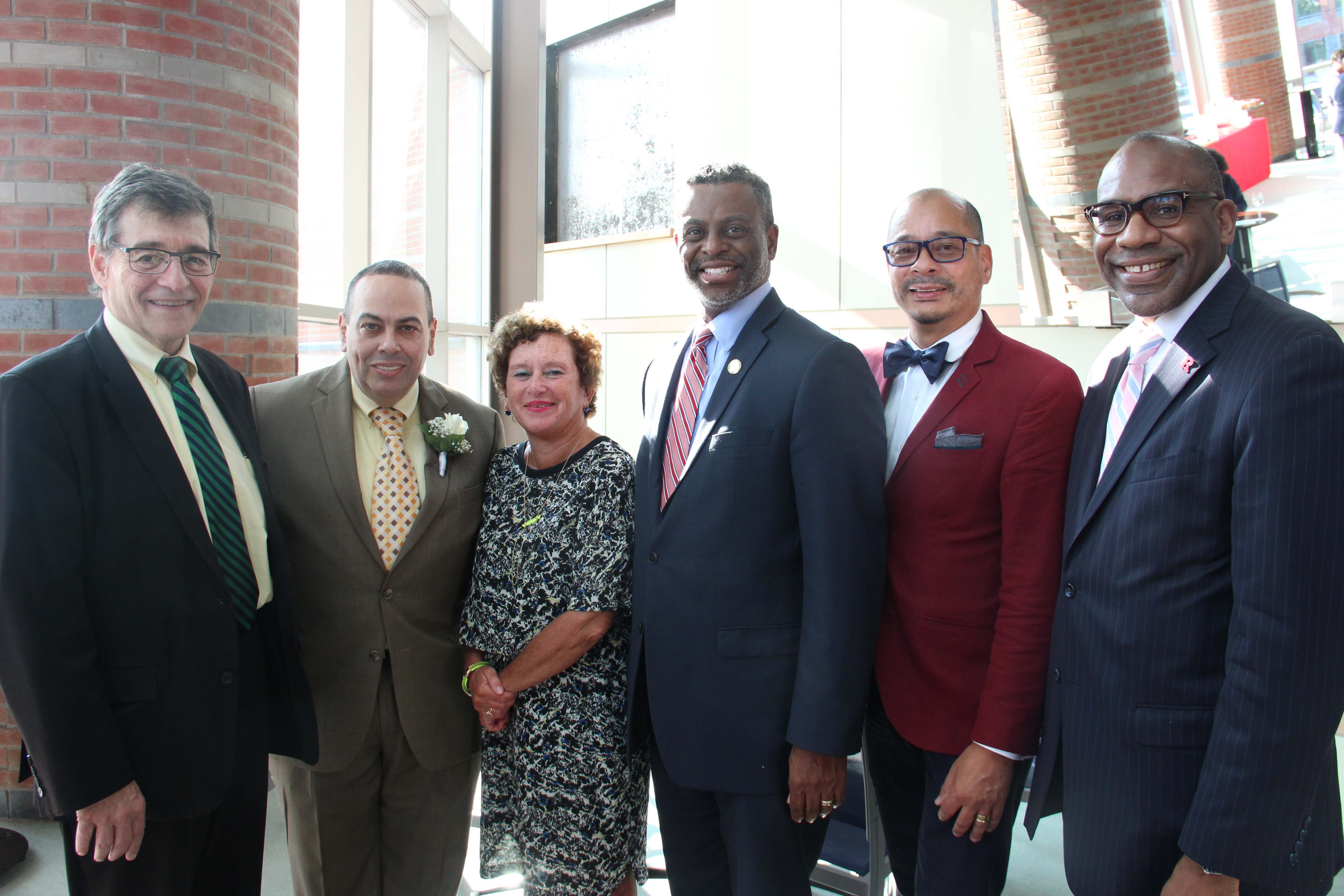
by Chanel L. Donaldson | Sep 4, 2018 | News1
[NEWARK, New Jersey – August 30, 2018] – Newark Community Partners recently honored the new Superintendent of Newark Public Schools Roger León at a reception at the New Jersey Performing Arts Center, Ryan Gallery. The Community Partners are the New Jersey Performing Arts Center, Newark City of Learning Collaborative (NCLC), Newark Trust for Education, Prudential Financial, and Rutgers University-Newark.
A brief program featured remarks from Reginald Lewis, Executive Director of NCLC, Rich Levao, President of Bloomfield College and Anthony Munroe, President of Essex County College.

The Superintendent is photographed with President Levao of Bloomfield College, Nancy Cantor, Chancellor of Rutgers University – Newark, President Munroe of Essex County College, Ron Chaluisán, Executive Director of the Newark Trust for Education and Reginald Lewis, Executive Director of NCLC.
Newark Community Partners Celebrate Superintendent Roger León
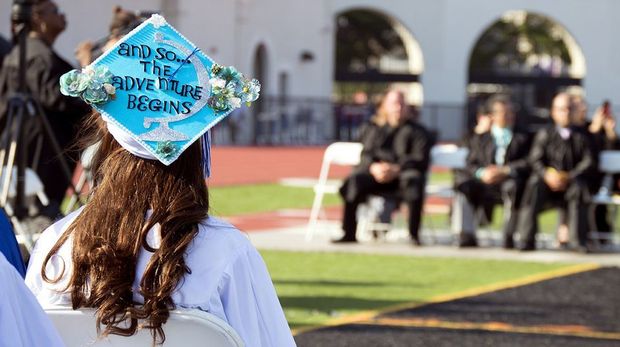
by Chanel L. Donaldson | Jul 30, 2018 | News1
New report from the Newark City of Learning Collaborative and Rutgers University-Newark’s School of Public Affairs and Administration highlights college-going trends
(Newark, NJ — July 30, 2018 ) Today, the Newark City of Learning Collaborative (NCLC) released Post-Secondary Outcomes of Newark High School Graduates, an analysis of what college-going looks like for nearly 13,500 of Newark’s recent graduates. Housed at the Joseph C. Cornwall Center for Metropolitan Studies, NCLC is working to build Newark’s college-going culture by ensuring that all Newarkers have the tools and resources needed to get to and through college. The report was produced in collaboration with the Rutgers University-Newark School of Public Affairs and Administration.
Covering approximately 85 percent of all Newark high school students who graduated between 2011 and 2016, the report examines college enrollment, persistence, and completion rates.
“The good news is that we know more Newark students are enrolling in college, but we also know that far too few are persisting to degree completion,” says NCLC Executive Director Reginald Lewis. “We hope that this report will serve as a resource to better understand the experiences of recent high school graduates.”
Post-Secondary Outcomes is truly groundbreaking because it is representative of graduates from traditional public, charter, vocational technical, and private schools. The report is the first of its kind, involving the participation of representatives from all of Newark’s school sectors.
“The cross-sector collaboration was one of the highlights of the project and enabled us to examine college-going for a wide range of Newark high school graduates. One of our goals was really to put schools in conversation – not competition – with one another to learn and share best practices throughout the community,” remarks the report’s co-author Dr. Kristi Donaldson.
Newark Public Schools currently enrolls over 60% of all Newark high school students. Newly appointed Superintendent Roger León has already demonstrated interest in collaboration and making college-going and college persistence a priority for NPS students. “I would like to thank Rutgers–Newark, the Newark City of Learning Collaborative, and SPAA for capturing this important data on Newark Public Schools high school graduates over the span of the last six years,” said Superintendent León. “While these numbers represent improvement over previous years, they remain far from where we should be. Our goal in Newark and my commitment is to propel students in an upward trajectory. Our students can soar academically and can compete nationally.”
Ryan Hill, founder and CEO of KIPP New Jersey, noted “the academic rigor of our K-12 education and the support we give our alumni and their families as they navigate their lives after high school have been critically important in helping our kids close the college opportunity gap and reach their potential.” Hill also highlighted the importance of “collectively work[ing] to expand college opportunities for Newark students.” In fact, KIPP recently supported a group of Newark Public School guidance counselors to attend their College Counseling Institute in San Antonio, TX, indicating greater interest in working together.[1]
With an increasingly large share of Newark students enrolled, Essex County Schools of Technology (formerly Essex County Vocational Technical Schools or ECVTS), made up the second largest subset of students in the study. Superintendent Dr. James M. Pedersen commented on the importance of Post-Secondary Outcomes by saying, “As we continue to improve our practices in preparing students to be successful in college and in the area of career-technical education, the findings and recommendations of this report will help us shape programs that hold students to high academic standards and spur better outcomes for them.”
As the only private school involved, St. Benedict’s Prep’s Headmaster Fr. Edwin Leahy noted his enthusiasm in taking part in the project adding, “We are eager to share what experience has taught us about not only getting young men into college, but also playing a role in supporting them through it … [and] learning from the other participating high schools as we continue our work to ensure that an even greater number of our graduates receive their college degrees within four or six years of leaving us.”
Ultimately, the findings of Post-Secondary Outcomes will help school leaders, educators, parents, and policymakers from across the city evaluate and strengthen the high school to college transition.
“This can help the city to make informed policy decisions to ensure as many young people as possible succeed at the college level,” says Lewis.
Community roundtables in each of Newark’s five wards are scheduled to take place this fall, beginning with a press launch at Newark City Hall in September.
To download the full report, click here.
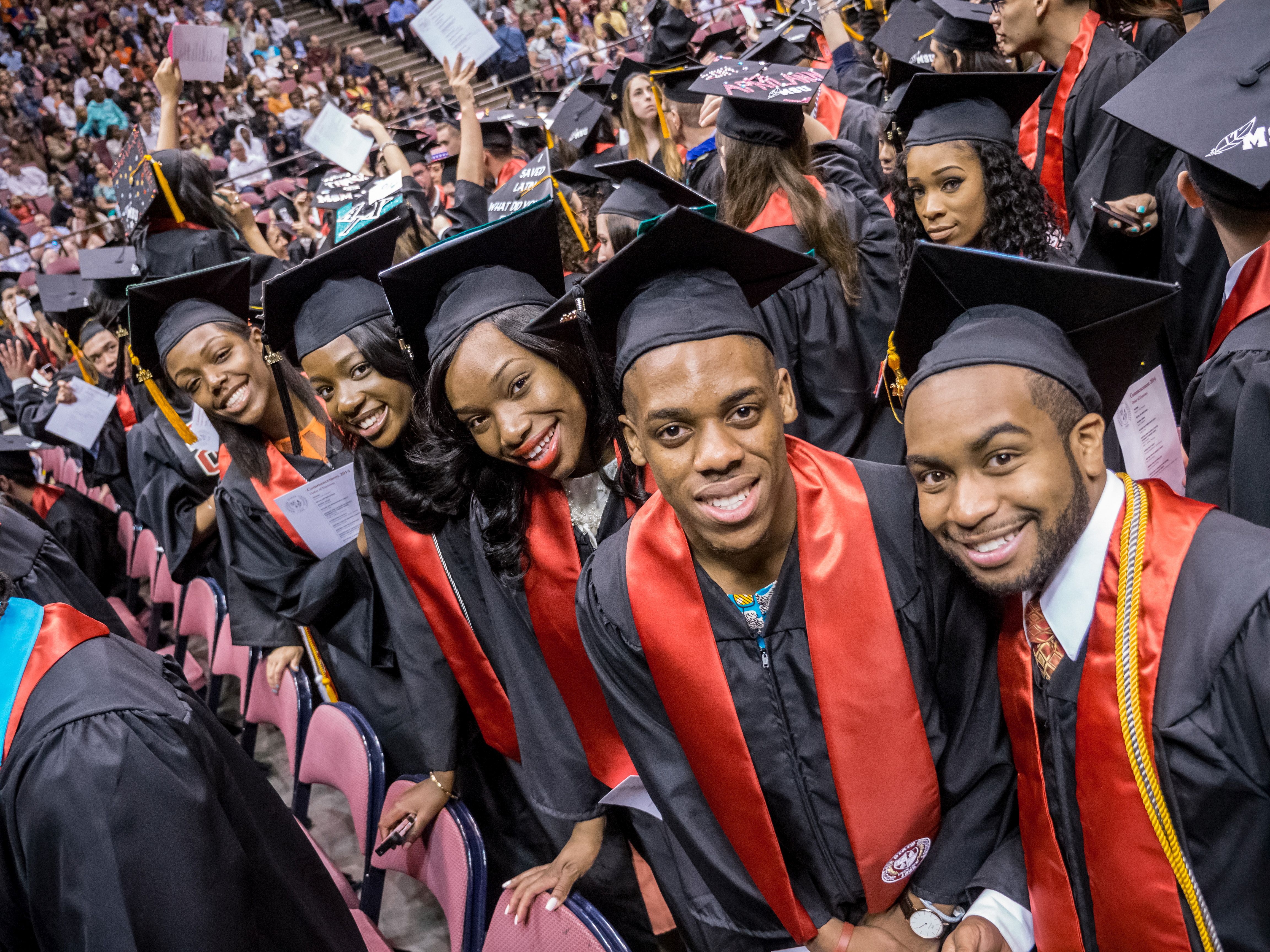
by Chanel L. Donaldson | Jun 29, 2018 | News1
This summer, the Newark City of Learning Collaborative (NCLC) is releasing Post-Secondary Outcomes of Newark High School Graduates, an analysis of what college-going looks like for 13,500 of Newark’s recent graduates. NCLC, which is working to build Newark’s college-going culture by ensuring that all Newarkers have the tools and resources needed to get to and through college, produced the report in collaboration with the Rutgers University-Newark School of Public Affairs and Administration. Covering approximately 85 percent of all Newark high school students who graduated between 2011 and 2016, the report examines college enrollment, persistence, and completion rates for graduates from traditional public, charter, vocational technical, and parochial schools. The findings will help school leaders, educators, parents, and policymakers evaluate and strengthen the high school to college transition so that as many Newark students as possible can succeed in college.
While overall college enrollment has increased for Newark high school graduates, it has declined for some graduates.
Almost two-thirds of Newark students enrolled in college after high school graduation, but over the study period, enrollment declined by close to four percent among graduates of comprehensive high schools. Unlike magnet schools, comprehensive public high schools have historically served some of Newark’s neediest students. More support is necessary to get the college enrollment rate up for graduates of comprehensive high schools.
More Newark high school graduates are going to four-year institutions.
Enrollment has increased at four-year colleges and universities for Newark high school graduates. The most commonly attended four-year institutions include Rutgers University-Newark, Kean University, Bloomfield College, and Montclair State University.
Persistence at two-year colleges is lower for Newark high school graduates than it is at four-year colleges.
Overall, nearly two-thirds of students persisted through their second year, meaning that most students returned to school after their freshman year. Persistence is a critical measure because if students persist from their first year to their second year, they are more likely to go on to complete their degree. However, persistence was substantially lower at two-year colleges, a problem that affects the approximately 28 percent of Newark high school graduates who start college at a two-year institution. Additional supports will help students who enroll at a two-year institution continue toward graduation or transfer to a four-year institution to earn a bachelor’s degree.
Not enough Newark high school graduates are earning a college degree within six years.
Only 23 percent of high school graduates earned a college degree within six years, the time frame commonly used to assess completion time for a bachelor’s degree. Merely helping students get into college is not enough to guarantee their success. Additional attention is needed to ensure students are staying enrolled in college and actually earning their desired degree or credential.
Ward-based roundtables to generate conversation and brainstorm solutions around these findings will take place in fall 2018. Engaging the community about how to best support Newark students to and through college is the ultimate goal.
To read the full report and view the schedule of upcoming roundtables, visit newarknclc.org.
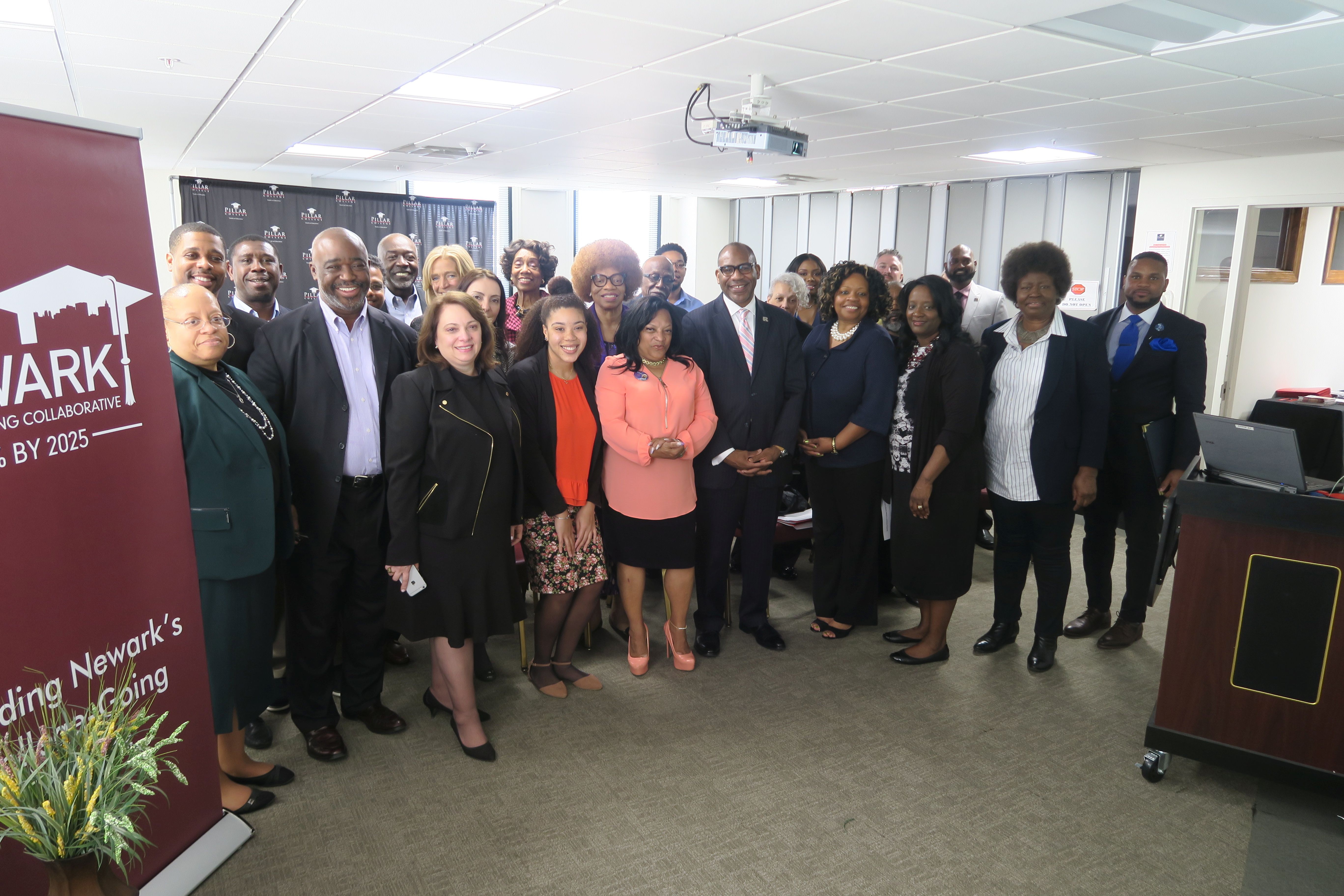
by Chanel L. Donaldson | May 9, 2018 | News1
On Thursday, April 26, 2018, the Newark City of Learning Collaborative (NCLC) gathered clergy members at Pillar College for the Inaugural Interfaith College Seminar: Exploring Newark’s College-Going Culture. The half-day seminar, which was co-sponsored by the City of Newark, The Positive Community Magazine, and Pillar College, introduced faith leaders from various Christian denominations and the Muslim community to the citywide mission of building Newark’s college-going culture.
Housed at Rutgers University-Newark’s Cornwall Center for Metropolitan Studies, NCLC is working to ensure that all Newark residents have the opportunity, information, and access to go to college, afford college, complete college, and ultimately obtain good jobs. During the Seminar, clergy received resources to bring back to their communities, including supports available for high school students and adult learners, as well as information for financing a college education. NCLC’s higher education partners NJIT, Berkeley College, Pillar College, Rutgers University-Newark, and Essex County College were among those present to provide resources and answer questions.
At the close of the Seminar, representatives from each house of worship took a pledge to serve as an NCLC ambassador, bringing tools for college success to their community and sharing the mission of NCLC widely. NCLC and its co-sponsors look forward to future events to further engage Newark’s interfaith community and continue to reach more Newark residents.










